The American Health Care Debate

Despite the introduction of the Affordable Care Act in 2010, there were more than 28 million uninsured people across the United States in 2015.
Nearly half of uninsured adults said the high cost of coverage was the primary reason they went without. Similarly, more than half struggled to pay medical bills at some point in the last 12 months.
Deciding which direction to take in terms of health care in the United States has been the subject of some of the most heated political debates in 2017. To understand more, we polled more than 1,000 Americans about their attitudes toward health care, what they would change about the system we have now, and how willing they’d be to pay more to help others receive quality care. Continue reading to see what we uncovered.
Health Care Hindsight

No one said understanding health care would be easy. Even President Trump admitted in February — after attempting to pass a replacement of the Affordable Care Act — that he had no idea “health care could be so complicated” and that it was “unbelievably complex.”
Given all the ins and outs of health care, how much do Americans really know? Of the five political parties, only one party scored higher than a C, on average, when quizzed. Libertarians managed to pull a passing grade — a B, on average — on our questionnaire.
While more than half of Republicans and Democrats scored either an A or B for their overall health care knowledge — some failed completely. One in 10 Democrats earned a D, on average, while 8 percent of Republicans finished with the same score. One percent of Democrats and 2 percent of Republicans received an F — the lowest score of any political party surveyed.
Federal Money Matters
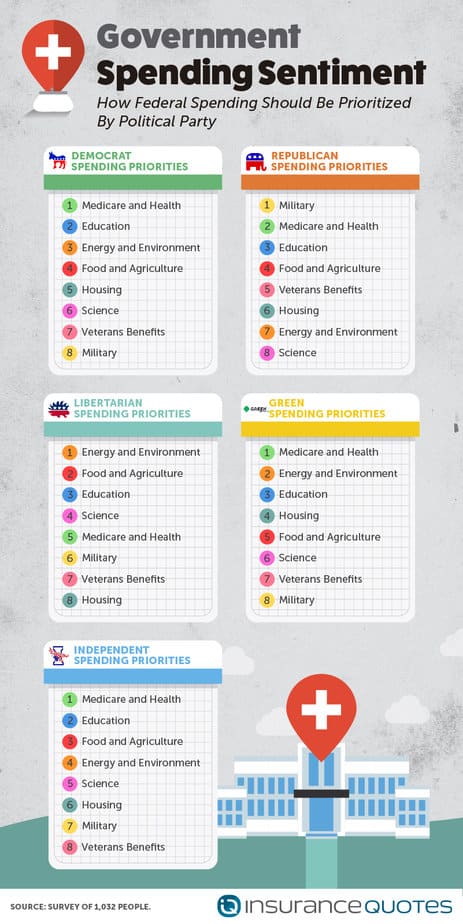
Health care is one of the most important issues to Americans today and was ranked as one of the most important spending priorities among those surveyed.
For participants who identified as a Democrat, Independent, or Green Party member, Medicare and health spending was the No. 1 budget priority. A recent survey found nearly two-thirds of Americans believe in providing at least a basic form of health care to the elderly and those with a low income, even if it means higher amounts of federal funding to ensure their coverage. As the health care debate rages on among lawmakers, a similar poll found nearly 40 percent of Americans are seemingly unaware of the cost-sharing reductions offered to low-income families by the 2010 Affordable Care Act.
Only Libertarians and Republicans prioritized another issue over Medicare and health care. For Libertarians, energy and the environment was a primary concern, while Republicans identified military spending as most important.
In March 2017, President Trump recommended a 10 percent increase in military spending over the 2016 budget, which would add $54 billion to the $600 billion budget. Republican lawmakers also generally favor universal access to health care rather than universal coverage. While the newly proposed American Health Care Act is estimated to reduce the budget deficit by $119 billion over the next 10 years, the number of uninsured Americans will climb to 51 million by 2026.
Who Would Be Willing to Pay?
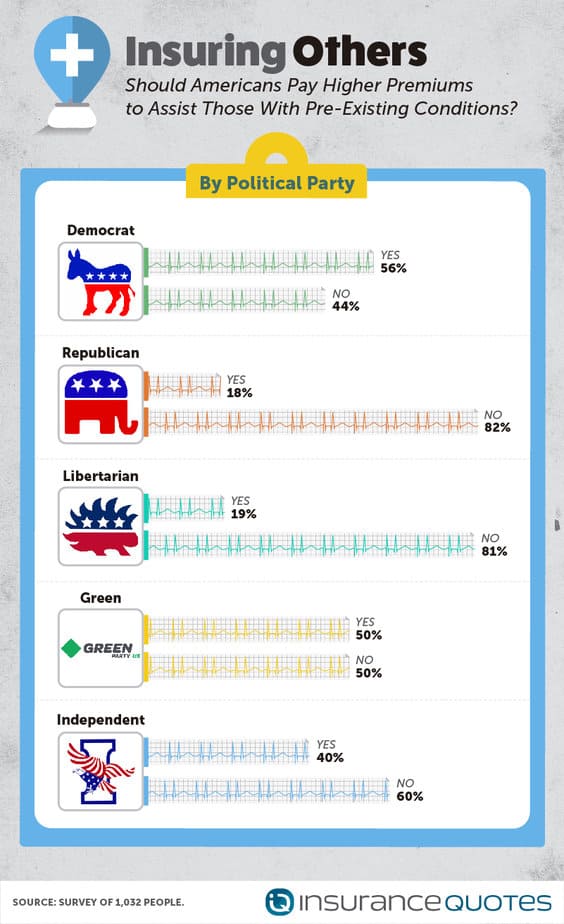
Republicans introduced their second attempt to repeal and replace the Affordable Care Act in late April 2017, and the language in the new American Health Care Act (AHCA) around pre-existing conditions was one of the most divisive elements of the bill. While Democratic lawmakers began running advertisements criticizing Republicans for reducing the protections of people with histories of injuries and illnesses — including sexual assault and mental illness — our survey found Democrats were the most supportive of paying higher premiums to assist others with pre-existing conditions (about 56 percent).
However, 82 percent of Republicans didn’t support the idea of citizens paying higher health care premiums to support pre-existing conditions for others. Under the newly proposed AHCA — while the bill does mandate coverage for pre-existing conditions — it would allow insurance companies to charge higher premiums for their care, potentially making them unaffordable for some.
Green Party respondents were split on the matter, while more than 40 percent of Independent voters and nearly 19 percent of Libertarians responded favorably to the idea of higher premiums.
Health Care a Right for All
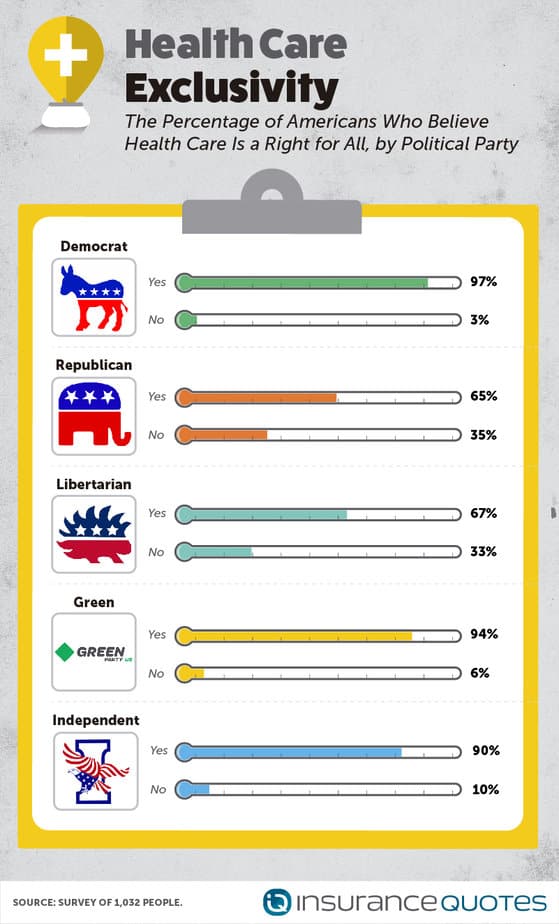
Among the fundamental differences in health care is the question of entitlement: Do all citizens deserve coverage, regardless of age or income? The question has become such a hot topic that it’s even been asked to beauty pageant contestants. We asked respondents to weigh in.
Nearly all (97 percent) of the Democrats believed health care was a right for all. While President Barack Obama said access to affordable health care in America was a right, not a privilege, 62 percent of Americans today prefer guaranteeing a “certain level of health coverage and financial help” for seniors and low-income citizens.
Our survey found 94 percent of Green Party voters and 90 percent of Independents agreed with this sentiment, claiming health care should be a right for everyone. In contrast, only 67 percent of Libertarians and 65 percent of Republicans said the same. While a majority still supports health care as a right, Republican lawmakers generally campaign on a position of lower premiums toward universal access rather than universal coverage.
Turning Away People Without Coverage
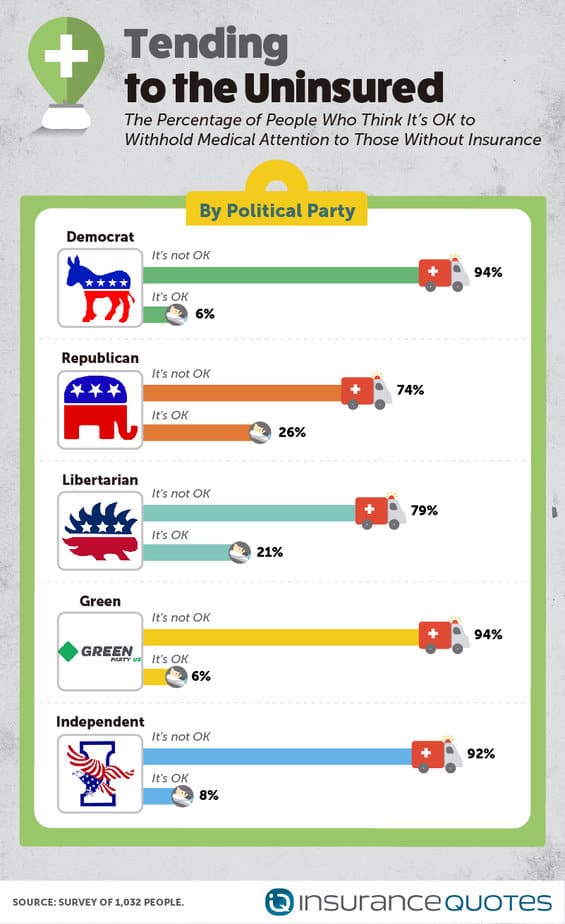
A majority of uninsured Americans earn lower incomes and live in states that have refused to expand Medicaid coverage. A study from 2009 found as many as 45,000 people every year die because of a lack of health insurance.
According to our survey, 94 percent of Democrats and Green Party members each believed it wasn’t OK to withhold coverage from those without insurance, and 92 percent of Independent voters said the same.
While a Republican lawmaker was recently booed offstage at a local town hall for telling his constituents that people don’t die “because they don’t have access to health care,” more than 1 in 5 Libertarian and 1 in 4 Republican survey respondents said it was OK to withhold care from patients who didn’t have medical insurance.
Take It or Leave It
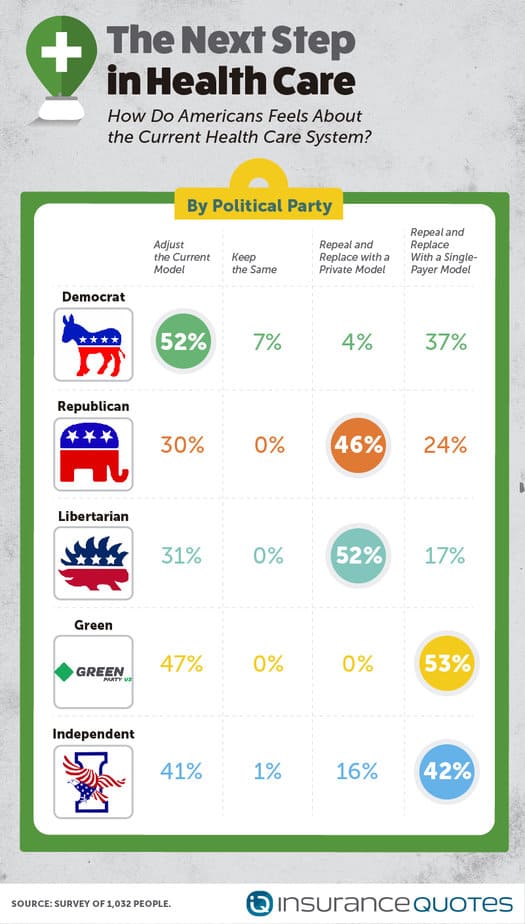
Americans seem to be torn about the next steps the country should take with health care. As a part of his efforts to get elected, Donald Trump even campaigned on the promise to repeal and replace the Affordable Care Act that’s been in place since 2010.
A majority of Democrats polled believe that with some adjustments, Obamacare could be the ideal health care program for America. More than 1 in 3 said they believed the system should be replaced with a single-payer model instead.
Single-payer health care — sometimes referred to as Medicare for all — was also popular among Green Party voters (53 percent) and Independents (42 percent). Popular in other countries around the world like Canada, Spain and Australia, one survey found more Americans support a single-payer health care system rather than oppose it.
Only Libertarians and Republicans wanted the current system to be replaced by a private model.
Your Health Care, Today
Regardless of what happens next, there’s no denying the costs of medicine and health care in the U.S. are expensive. In 2014, health care costs rose over 5 percent to $3 trillion — more than $9,500 per person. While people around the country have different opinions on how to proceed or how to manage people without the means for coverage, a majority of people believe health care is a right, regardless of political affiliation.
If you’re concerned about qualifying for health care subsidies or the programs you might qualify for today, visit us online at insuranceQuotes. We help provide free customized health insurance quotes based on providers in your area. Health insurance can be complicated, but it shouldn’t cost you a fortune. Visit us online today to learn more.
Sources
- http://kff.org/uninsured/fact-sheet/key-facts-about-the-uninsured-population/
- http://www.cnn.com/2017/02/27/politics/trump-health-care-complicated/
- http://kff.org/health-costs/poll-finding/kaiser-health-tracking-poll-health-care-priorities-for-2017/
- http://kff.org/health-reform/report/kaiser-health-tracking-poll-late-april-2017-the-future-of-the-aca-and-health-care-the-budget/
- https://qz.com/937285/donald-trumps-proposed-54-billion-boost-to-defense-spending-is-bigger-than-the-total-annual-military-budget-of-all-but-two-countries/
- http://money.cnn.com/2017/01/12/news/economy/obamacare-republicans-health-care/
- https://www.nytimes.com/2017/05/05/us/politics/republican-health-care-bill-pre-existing-conditions.html
- https://www.usatoday.com/story/news/politics/2017/05/04/fact-check-pre-existing-conditions-debate/101283530/
- http://www.al.com/news/index.ssf/2017/05/is_health_care_a_right_or_a_pr.html
- http://www.cnsnews.com/news/article/ali-meyer/obama-access-affordable-health-care-isn-t-privilege-it-s-right
- http://kff.org/health-costs/poll-finding/kaiser-health-tracking-poll-health-care-priorities-for-2017/
- http://money.cnn.com/2017/01/12/news/economy/obamacare-republicans-health-care/
- http://health.usnews.com/health-news/health-insurance/articles/2015/06/25/5-tips-for-navigating-medical-care-without-health-insurance
- http://news.harvard.edu/gazette/story/2009/09/new-study-finds-45000-deaths-annually-linked-to-lack-of-health-coverage/
- https://www.washingtonpost.com/news/powerpost/wp/2017/05/06/nobody-dies-because-they-dont-have-access-to-health-care-gop-lawmaker-says-he-got-booed/?utm_term=.1ab74e88db38
- http://www.politifact.com/truth-o-meter/article/2016/jul/15/donald-trumps-top-10-campaign-promises/
- http://time.com/money/4733018/what-is-single-payer-healthcare-system/
- http://www.beckershospitalreview.com/finance/17-fascinating-statistics-on-the-current-state-of-us-healthcare-spending-finances.html
- /
- /health
Methodology
We surveyed 1,032 individuals, asking them about their knowledge and opinions on health care. Using the data generated from the survey, we were able to segment responses by political party and analyze the general opinion within those parties.
Fair Use Statement
No matter what your political affiliation is, we encourage you to share our content for noncommercial purposes. Please be sure to link back to this page to give the original authors credit for their work.
